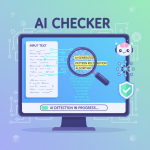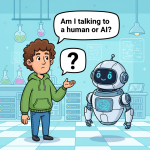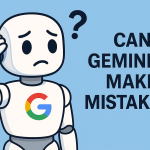Can any AI write a 10 page essay that actually makes sense, flows logically, and feels human?
This question has become incredibly relevant in the age of advanced AI models capable of generating thousands of words in minutes. From students to content creators, everyone is wondering whether artificial intelligence can truly handle long-form writing that meets academic or professional standards.
In this article, we’ll explore how AI can write a 10 page essay, its capabilities and weaknesses, best practices for using AI tools effectively, and what ethical and practical implications you should consider.
What Does It Mean for AI to “Write a 10 Page Essay”?
When we say “AI writes a 10 page essay,” we’re referring to language models that can generate coherent, structured, and detailed text around a central topic — typically between 3,000 and 4,000 words.
Modern AIs like ChatGPT, Gemini, Claude, and others can easily produce text at that scale. However, length alone doesn’t guarantee quality. What matters is:
Logical organization (introduction, body, conclusion)
Coherence and argument continuity
Accuracy of information
Readable, human-like style
So yes — AI can write a 10 page essay. But whether it’s good enough depends on prompt clarity, human oversight, and editing.
How AI Handles Long-Form Essay Writing
Artificial intelligence is remarkably capable of generating multi-page essays thanks to large-scale training on text data. Let’s look at the key factors that enable this.
1. Contextual Understanding
Modern AI models are trained on billions of words. They understand how essays are structured — from thesis statements to topic sentences and transitions. This helps them maintain coherence across long texts.
2. Prompt-Driven Structure
AI doesn’t “think” like humans. It relies entirely on the prompt. The more detailed your instructions — such as sections, tone, and arguments — the more relevant and organized your 10 page essay will be.
3. Style and Tone Consistency
AI can maintain a consistent writing tone, whether academic, persuasive, or narrative. That’s a major advantage for producing professional-sounding essays quickly.
4. Vocabulary and Grammar Strength
One of AI’s strengths is linguistic fluency. It rarely makes grammatical mistakes and tends to use sophisticated vocabulary, making the essay sound polished.
Where AI Falls Short: The Limitations of AI Essay Writing
While AI can technically produce a long essay, it struggles with depth, accuracy, and originality. Let’s explore these weaknesses in more detail.
1. Coherence Over Long Distances
AI sometimes loses track of its main argument when writing thousands of words. The essay may start strong but drift into repetition or tangents by page 6 or 7.
2. Factual Inaccuracy (Hallucination)
AI can “hallucinate” — meaning it makes up data, sources, or events that don’t exist. This is dangerous in academic writing where factual reliability is crucial.
3. Lack of True Critical Thinking
AI can summarize ideas well but struggles to form original opinions, critiques, or deep analysis. It mimics logic rather than understanding it.
4. Repetition and Redundancy
Long essays generated by AI sometimes reuse similar phrases or rephrase previous points instead of introducing new insights.
5. Citation and Source Problems
AI can fabricate citations or misattribute quotes. Always double-check any references it provides using academic databases.
How to Get a High-Quality 10 Page Essay from AI
If you’re using AI to draft or assist with essay writing, here’s how to make the process efficient and trustworthy.
Step 1: Craft a Strong Prompt
Give specific details:
Topic and thesis
Subheadings or structure
Word count per section
Tone (academic, analytical, persuasive)
Formatting needs (APA, MLA, etc.)
A vague prompt like “Write a 10 page essay on climate change” will give a generic result. A detailed prompt like “Write a 10 page analytical essay on the socio-economic impacts of climate change in developing nations, with 3 case studies and data references” will yield far better output.
Step 2: Generate an Outline First
Ask the AI to create an outline before writing. This ensures logical flow and helps you identify gaps early.
Step 3: Write in Sections
Instead of generating all 10 pages at once, break it into parts (e.g., introduction, sections 1–4, conclusion). This maintains topic focus and coherence.
Step 4: Review, Edit, and Fact-Check
Never publish or submit AI text without review. Edit for accuracy, add transitions, and verify every claim or statistic.
Step 5: Humanize the Content
Add your own insights, examples, and commentary. This makes the essay authentic and less likely to be flagged as AI-generated.
Step 6: Use Plagiarism and AI Detectors Wisely
Run your essay through plagiarism checkers and readability tools, but remember — AI detectors aren’t perfect. Focus on ensuring originality and clear authorship.
Benefits of Using AI for Essay Writing
Despite its flaws, AI-assisted essay writing offers tangible advantages for professionals, students, and writers.
Speed: Generate a full first draft in minutes.
Organization: Automatically builds structure and flow.
Idea Expansion: Useful for brainstorming new perspectives.
Language Support: Helps non-native speakers improve grammar and clarity.
Research Assistance: AI can quickly summarize or paraphrase existing information.
AI is best used as a writing partner, not a replacement for thinking.
Use Cases Where AI Excels
1. Drafting Research Summaries
AI can summarize long research papers into digestible sections for background material.
2. Creating First Drafts for Professionals
Writers, marketers, and executives can use AI to generate rough drafts of white papers, reports, or blogs that they later refine.
3. Educational Support
Students can use AI to learn structure, improve essay formatting, and get feedback on grammar or argument flow (without cheating).
4. Large-Scale Content Creation
Companies producing reports or website content can leverage AI for long-form writing to save time and costs.
Risks and Ethical Concerns
Using AI for essay writing isn’t without ethical implications. It’s essential to understand the boundaries.
Academic Integrity
Submitting AI-generated essays as your own violates most academic policies. AI should assist learning, not replace it.
Detection and Transparency
Educators and organizations now use AI detection tools to check authenticity. Transparency about AI use helps avoid penalties.
Misinformation Risk
Without fact-checking, AI might generate false claims, harming your credibility or spreading misinformation.
Over-Reliance on AI
Relying too heavily on AI may weaken your personal writing and reasoning skills over time.
Privacy and Data Concerns
When you input private information or unpublished data into AI systems, that data may be stored or analyzed. Always review terms of service.
Human vs. AI Essay Writing: Key Differences
| Aspect | Human Writer | AI Writer |
|---|---|---|
| Creativity | Original insights, emotions, humor | Pattern-based imitation of creativity |
| Accuracy | Fact-checked and sourced | May generate false or mixed data |
| Consistency | Depends on skill level | Consistent tone but lacks depth |
| Critical Thinking | Connects abstract ideas logically | Follows surface-level logic |
| Revision Ability | Can self-critique and adapt | Needs explicit feedback or re-prompting |
Both have strengths, but human reasoning remains irreplaceable for true originality.
Tips to Make an AI-Written Essay Sound More Human
Add personal anecdotes or real examples
Vary sentence lengths and structure
Use emotional or reflective transitions
Include rhetorical questions
Add small imperfections — natural pauses or informal touches
These elements make the text sound authentic and reader-friendly.
Future Outlook: AI and Academic Writing
AI writing is evolving fast. In the near future, models will better understand context, cite real sources, and maintain long-term memory for essays exceeding ten pages.
However, human input will remain vital. The best essays will come from collaboration between humans and AI — machines providing structure and efficiency, humans adding reasoning and originality.
Conclusion
So, can any AI write a 10 page essay?
Yes — but only with help.
AI can generate well-structured, fluent essays, but coherence, accuracy, and insight still depend on human oversight. Used responsibly, AI tools can speed up research, improve organization, and support better writing — as long as writers remain active participants in the process.
Whether you’re a developer, researcher, or student, treat AI as your writing assistant, not your ghostwriter. Combine human intellect with machine efficiency to achieve truly high-quality long-form writing.
Frequently Asked Questions
Q1: Can AI generate a complete 10 page academic essay automatically?
Yes, AI can produce that length, but quality varies. Without detailed prompts and editing, the output may lack depth or contain inaccuracies.
Q2: How do I make an AI-written essay undetectable?
Focus on rewriting, adding original insights, and mixing AI content with your own. Detection tools flag uniform sentence patterns and lack of personal voice.
Q3: Is it ethical to use AI for essay writing?
It’s ethical when disclosed and used for assistance (e.g., drafts or outlines). Passing off AI-written work as personal writing violates most academic codes.
Q4: Which AI is best for long essays?
Advanced models like GPT-based systems or similar LLMs perform well, especially when given structured prompts and section-by-section instructions.
Q5: Can AI replace human essay writers?
Not yet. AI can accelerate writing and improve productivity, but critical thinking, creativity, and emotional intelligence still require human authorship.
Final Call to Action
If you want to explore AI-assisted essay writing, start small.
Use AI to create an outline, then expand it manually. Edit deeply, add data, and let your ideas drive the piece. When used thoughtfully, AI becomes a creative amplifier, not a substitute for originality.








